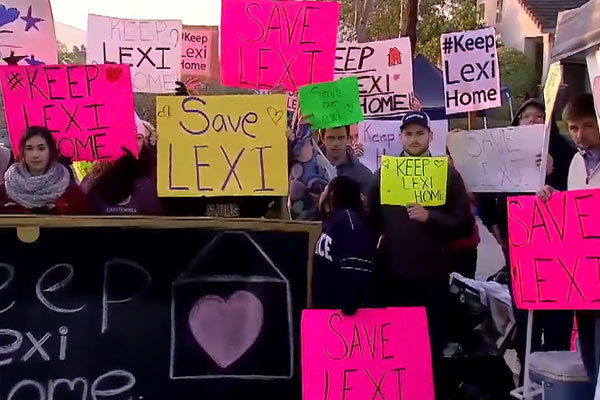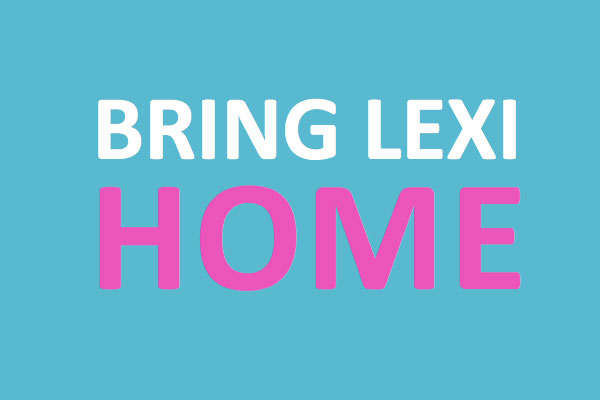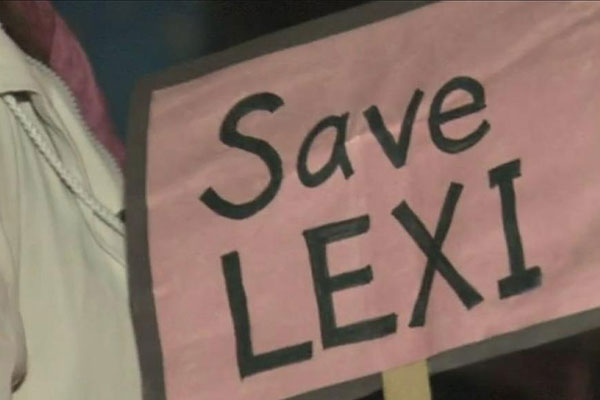Whether a child is eligible for adoption is determined by California law (see Family Code §8606). This case is a bit more complicated, because there is a special law, the Indian Child Welfare Act (ICWA), which governs children who have any Native American ancestry. Sometimes the relationships between the laws become difficult. (Under the ICWA, which applies to children with any Native American ancestry, no matter how minute, has been subjected to some serious questioning by legal experts. If you are interested, read here: https://goldwater-media.s3.amazonaws.com/cms_page_media/2016/3/25/lexibrief.pdf )
When the laws are difficult to sort out, the parties go to court to ask the judges what to do.
So here we have people arguing “Lexi is not adoptable”.
A little bit of logic will tell you this argument simply is not true. If the Pages could not adopt Lexi, then there would be no legal dispute.
Parties to a lawsuit will make assertions of what they want the court to do. Very often, parties will make these assertions as if they were unquestionably true – when in reality, these assertions are just the positions of the parties.
When the “authorities say” Lexi was “never up for adoption” (http://indiancountrytodaymedianetwork.com/2016/03/22/breaking-california-returns-child-family-icwa-case-163881), they are merely making an assertion. They are advocating a position. It would make sense for them to do this, because everyone believes that they are doing the “right thing” – and everyone wants to be seen as doing the “right thing”.
Don’t confuse arguments with facts.
People who make unfortunate arguments like “Lexi is not adoptable” should be directed to first read the judicial decisions in this case. You may find them here: http://www.courts.ca.gov/opinions/archive/B252999.PDF
If you read the judicial decisions and the news stories, you will learn many facts which help explain why the court has been willing to consider the Pages as the legally proper home for Lexi.
When a child is taken into the foster care system, the social workers try very hard to reunite the child with her parents. That was not possible here, “Alexandria’s father successfully complied with reunification services for more than six months, progressing to such an extent that he was granted unmonitored eight hour visits. By June 2012, the Department reported a substantial probability he would reunify with Alexandria within the next six months. Shortly thereafter, however, father’s emotional state deteriorated dramatically. He separated from his new wife, left California, and did not visit Alexandria after July 28, 2012. By September 2012, he had communicated to the Department that he no longer wished to continue reunification services.” (Pages 6 & 7 of Court of Appeals document)
When reunification fails, the court must then decide a permanent plan for the child (usually agreeing to the concurrent plan, if it exists). In this case, adoption was decided as the permanent plan for Lexi. The court record describes Ginger R. as “Alexandria’s extended family member and proposed adoptive mother”. (Page 10) In this case, the tribe was granted “placement preference”. But while the tribe is granted preference in the placement of the child, they do not have the right to decide what options the court is allowed to consider, as NICWA suggested in their recent pledge. If that were true, then it would render the good cause exception meaningless and we would not be here today.
Here are some other facts which help explain why the Pages and their attorneys have argued that Lexi should stay with them and should be adopted by them:
- “Alexandria’s guardian ad litem and court-appointed attorney requested a “Do Not Remove” order to prevent Alexandria from being moved out of state without a court order.” (Page 10 of Court of Appeals document) The Page’s did not even have a say/voice in court at that time.
- The dependency court allowed a “good cause hearing”, which specifically is used to determine if the ICWA’s placement preferences could be deviated from for the Pages to adopt—the court would never have allowed that if the Pages were not eligible to adopt, but instead they allowed a good cause hearing to be scheduled. If the Pages were not a possible appropriate family for Lexi, this hearing would not have taken place.
- “On July 29, 2013, the court commenced a hearing that spanned five days over the course of three months to determine whether good cause existed to permit Alexandria to remain with the P.s, rather than placing her with the R.s in Utah in accordance with the ICWA’s adoptive placement preferences.” (Page 13)
- If the Page’s had no standing to adopt Lexi, then the Court of Appeals would have denied the petition right from the start, and never would have heard the case.
- In the Court of Appeals document, there is no suggestion in the judge’s opinion, that the Pages lacked standing to adopt Lexi. To the contrary, it makes it clear that under the correct standard, even under ICWA, the Pages were the likely choice for adoption.
- At the first “good cause” hearing, the court ruled against the Pages. The Pages asked the Court of Appeals to review that determination, because they believed the court used the wrong standard to determine whether Lexi should stay with the Pages. The Court of Appeals said the Pages were correct. The opinion in 2014 said “it is reasonably probable that the court’s decision would have been different had it applied the correct good cause standard….considering Lexi’s best interests, including the strength & longevity of her bond to the Pages and the trauma she may suffer if that bond is broken.” (Page 39 of Court of Appeals document) That means, that if the first judge had used the correct legal standard, Lexi would likely have remained with the Pages and no one would have ever heard about this case.
- The Court of Appeals also explained, “In fact the bond between Alexandria and her caretakers and the trauma that Alexandria may suffer if that bond is broken are essential components of what the court should consider when determining whether good cause exists to depart from the ICWA’s placement preferences.” (Page 38) There is nothing that says Lexi was not adoptable.
- During oral arguments on 06/10/2016, nobody ever made an argument that the child was not eligible to be adopted.
Some people say that the family in Utah was always supposed to be the proper family. Some say that the Pages prevented the Utah family from being involved. If you think about it, you can see that the Pages would have had no ability to stop people in Utah from adopting Lexi. The Pages can’t do anything except ask the Court or DCFS to let Lexi stay. Obviously, it was someone else who made these decisions and then enforced these decisions.
The family in Utah was virtually stone-walled by the tribe & DCFS when they requested Lexi: “The R.s expressed their interest in adopting Alexandria as early as October 2011. They were initially told that to avoid confusing Alexandria, they should not contact her while father attempted to reunify. If reunification efforts failed, they were the tribe’s first choice for adoption” (Page 7 of Court of Appeals document, emphasis added) At the end of the day, it is the court, not the tribe that makes the final decision, even in ICWA cases.
Some also suggest that Lexi is unadoptable because the father’s parental rights have not been terminated. This is also a grave misunderstanding, and will be clarified in a later point.
Another thing to recognize is that, under California state law, the Pages would have become the preferred placement after reunification services were terminated. “Notwithstanding any other law, the application of any person who, as a relative caretaker or foster parent, has cared for a dependent child for whom the court has approved a permanent plan for adoption, or who has been freed for adoption, shall be given preference with respect to that child over all other applications for adoptive placement if the agency making the placement determines that the child has substantial emotional ties to the relative caretaker or foster parent and removal from the relative caretaker or foster parent would be seriously detrimental to the child’s emotional well-being. As used in this subdivision, “preference” means that the application shall be processed and, if satisfactory, the family study shall be completed before the processing of the application of any other person for the adoptive placement of the child.” (WIC Sec 366.26, subdivision (K))
For further information on the caretaker preference, refer to https://bondsunbroken.wordpress.com/


